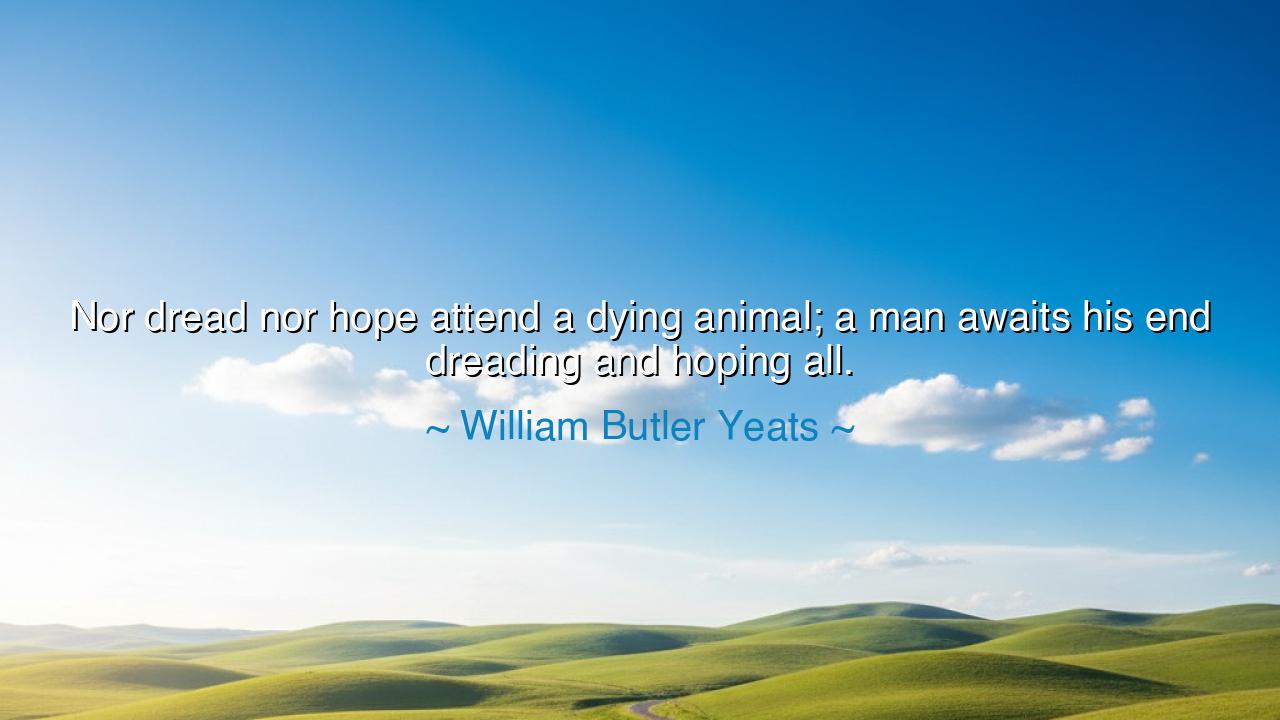
Nor dread nor hope attend a dying animal; a man awaits his end
Nor dread nor hope attend a dying animal; a man awaits his end dreading and hoping all.






“Nor dread nor hope attend a dying animal; a man awaits his end dreading and hoping all.” Thus wrote William Butler Yeats, the poet-prophet of Ireland, whose verses dwell upon the fragile and divine nature of the human soul. In this line, drawn from his poem “Death,” Yeats reveals one of the deepest paradoxes of human existence: that to be human is to live suspended between fear and faith, dread and hope. The dying animal knows only the immediacy of the body, the sharp pang of ending. But man, blessed and burdened with consciousness, must face his mortality not only in flesh, but in mind and spirit.
The animal, bound to the present, dies as it has lived—without reflection. It does not wonder why it must perish, nor does it imagine what lies beyond. Its death is an instant, a silence without echo. But man, who has eaten from the tree of knowledge, cannot die so simply. He has looked into the mirror of his own awareness and seen eternity flicker there. And so, when death approaches, he trembles not only for his body but for his soul. He dreads the loss of being, yet hopes for a dawn beyond the grave. This duality, Yeats tells us, is both the glory and the torment of humankind.
To live as a human being is to carry both heaven and earth within oneself. Our dread springs from knowing that all we love must one day fade; our hope arises from believing that love itself endures beyond that fading. This struggle has shaped every age of human thought—from the hymns of ancient Egypt, carved on tomb walls to guide the dead into the afterlife, to the philosophies of Greece, where Socrates drank the hemlock not in despair, but in serene confidence that his soul would journey onward. The beasts knew nothing of this hope or dread, but man, who can imagine eternity, can never again rest wholly in the peace of ignorance.
Yeats, a poet of mystical longing, wrote these words at a time when Europe stood in the shadow of war and decay. He watched the collapse of empires and the erosion of faith, and in this line, he sought to define the essence of what remained—the consciousness of the human soul. To him, the animal dies in peace precisely because it is untouched by the burden of meaning. The man, however, cannot help but seek meaning even in his ending. He is haunted by both terror and transcendence, yearning to find pattern in the chaos of his mortality. Yeats’s words are not merely lament—they are reverence. For in man’s dread and hope lies the proof of his divinity.
Consider the life of Siddhartha Gautama, the Buddha. Born into privilege, he was shielded from suffering until he beheld the sight of sickness, old age, and death. In that moment, the dread of mortality awakened within him, and he abandoned all comfort to seek truth. Yet through years of meditation and struggle, that dread was transformed into hope—a hope not of endless life, but of liberation from fear itself. The Buddha’s enlightenment was the reconciliation of these two forces. He saw that to live without dread or hope, as the animals do, is to escape suffering—but to transcend both, as the awakened do, is to achieve peace through understanding.
This is the eternal teaching Yeats whispers through time: that to be human is to wrestle between dread and hope, and that within this struggle lies our greatness. We are not meant to flee it, but to learn from it. The trembling before death, the yearning for meaning, the refusal to accept that existence is mere dust—these are not weaknesses, but signs that we carry the spark of the infinite within us. The dying animal perishes in silence, but the dying man leaves behind words, prayers, songs—a legacy of spirit. Through hope and dread, he shapes civilization itself.
So, my child of the future, take this wisdom to heart: do not curse your fears, nor mock your hopes. They are the twin wings that lift the soul. To dread is to care; to hope is to believe. Live knowing that both will accompany you, not as burdens, but as teachers. Let your dread remind you that life is precious and fleeting; let your hope remind you that it is sacred and enduring.
For the day will come when you, too, must face the silence beyond the horizon. And in that hour, may you stand not as the unknowing animal, but as the conscious being, trembling yet transcendent, dreading and hoping all—aware that within that trembling lies the essence of what it means to be human.






AAdministratorAdministrator
Welcome, honored guests. Please leave a comment, we will respond soon